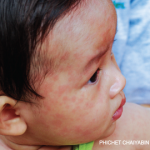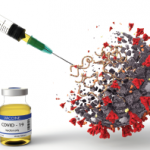Our current measles vaccine is effective with durable protection; however, natural measles infection provides even better protection than vaccination, even many decades later, explains Dr. Calabrese. Patients born before 1957, when the measles virus was actively circulating, are generally considered to have lifelong immunity.
The large majority of people who received at least one measles vaccination should be sufficiently protected. However, the ACIP recommends re-vaccination for the small percentage of people who received an inactive version of the vaccine from 1963 to ’67, who never received an additional live vaccine or whose vaccination type during this time frame is uncertain.14
If a patient’s vaccination status is unclear, practitioners may consider drawing an IgG measles titer to check immunity. If negative, the measles vaccine is recommended. The measles vaccine is also recommended for patients who’ve had a known measles exposure (if born after 1957 and without at least one previous vaccination with live measles virus vaccine). Giving the vaccine within 72 hours can help prevent infection or lessen its severity.14
The situation can be more complicated for rheumatology patients taking certain therapies. Per recommendations from the Infectious Diseases Society of America (IDSA) and the ACR, live vaccines, such as the measles vaccine, are not recommended for people taking biologic medications. For these patients, live vaccinations should be deferred. Or, if deemed necessary, such medications should be held for several weeks prior to and post vaccination, with careful shared decision making based on specific patient risks of disease flare versus infection.15
However, patients on less than 20 mg equivalent prednisone or low-dose, non-biologic DMARDs (e.g., less than 0.4 mg/kg methotrexate per week) can safely receive live virus vaccines.15,16
No antiviral therapies are available for measles, but for patients on these medications, IVIG given within six days of exposure can provide some limited protection, Dr. Calabrese notes. In case of a confirmed measles infection, immunosuppressant medications should be held, she adds.
Current recommendations do not speak to the need to check IgG levels for evidence of immunity before starting a biologic, which would delay treatment and be unnecessary for most patients. However, providers practicing in areas with more active outbreaks may need to be more proactive in assessing immunization (and titers, if immunization status is unknown) before starting a biologic therapy.
Vaccine Hesitancy
High vaccine uptake is needed to provide sufficient community herd immunity to protect immunocompromised people, infants and the low percentage of people who failed to respond to their measles vaccinations. But for complex reasons, vaccine hesitancy may be on the rise, partly in response to vaccine rollout during the COVID-19 pandemic.



